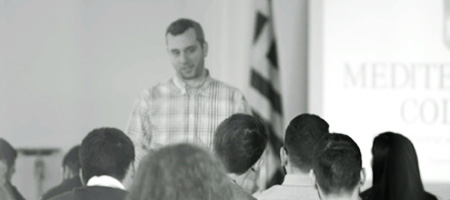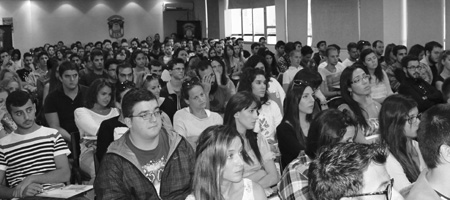
BSc (Hons) Computer Science
- One of the most up-to-date “Microsoft Friendly” software development courses in Greece.
- Teaches cutting-edge programming languages (C#, Java, Python, PHP)
- Includes application development, embedded programming, mobile programming with Android operating system.
- Students gain an in-depth programming knowledge and even develop their own programming language!
- The Networks courses are delivered in certified Cisco Academy Computer Networks Labs.
- Special modules on Network Security and Ethical Hacking.
- Students prepare projects and develop applications for real businesses.
Computer Science


Course Information
The BSc (Hons) Computer Science aims to develop students the most essential skills required in software development and programming. Specifically, the course fully covers the specialised fields of application development, embedded programming, mobile programming with Android operating system and games, in order for students to be prepared for a successful professional career in the software industry. At the same time, students explore the practical and theoretical aspects as well as the methodologies of developing and maintaining software systems, while developing the required technical and professional skills.
Throughout the programme students use all the latest programming tools, languages and industry methods being, thus, able to develop software independently, reliably and effectively, meeting today’s industry needs. Teaching staff are scientists and researchers, as well as professionals of the computer science industry.
The programme addresses high school graduates who wish to build a career in Computing.
Requirements for registration:
- High School leaving certificate (Apolyterion) from a General or Vocational Senior High School (or equivalent)
- Reference Letter (1)
- Adequate knowledge of English (IELTS 4.5 or equivalent) *
- Academic Interview
- Photos (2)
- ID-Card/ passport
*The level of English required for the English-taught programme is equivalent to IELTS 6.0 or B2. Candidates without official English language certificates can sit the English language placement test of Mediterranean College.
Holders of Higher National Diplomas (HND), students of Technological (TEI) or Higher Education Institutions (AEI) of relevant fields may be admitted to an advanced stage of the course, upon a Recognition of Prior Learning procedure. They need to additionally submit:
- Diploma and/or academic transcript
- Programme Handbook (if available)
This course comprises 20-credits modules, except for the diploma thesis of the 3rd year that equals to 40 credits. Most of the modules are semester-based, while there are few yearlong ones. First year modules and 50% of the 2nd year modules are taught & assessed in Greek, while the remaining modules are taught & assessed in English. (Note: This programme is also delivered entirely in English).
The programme emphasises on new technologies, such as android, cloud computing, mobile computing and covers all basic programming languages. Its highlight is that students develop fundamental and in-depth knowledge of software engineering (irrespective of the programming languages they might learn to use) as they learn how to develop algorithms and languages. Therefore, they are protected against changes in programming tools that inevitably occur over the years and possess the ability to comprehend any new language that emerges.
In the final year students are able to develop their own programming language and through designated modules they also become familiar with the business world, since they implement CRM applications and design integrated software applications for virtual businesses.
| Year 1 | Year 2 | Year 3 |
| Introduction to Computer Science | Networks and Security | Systems Programming |
| Computational Mathematics | Databases | Distributed Systems |
| Programming I | Graphics I | Cryptography and Coding |
| Networking Fundamentals | Application Development | Language Design and Implementation |
| Foundations of Computer Science | Software Engineering | Independent Studies |
| Programming II | Team Project | |
| English I | English II |
You’ll learn through a mixture of lectures, tutorials and laboratory work. A considerable amount of e-learning support material is also provided. There will be a strong emphasis on practical programming skills and you’ll use cutting-edge software development tools in our industry-quality labs. The learning methods we use are:
- Lectures, to cover theory.
- Seminars, to solve problems and practical exercises.
- labs, to apply theory and get “hands on” training in programming.
- clinics (supporting classes), to tackle the most difficult parts of the modules.
- tutorials, to provide one-on-one support to students.
- independent learning, where students engage in self-directed study.
Assessment is done mostly through coursework, although in each year there are a small number of computer-based exams. In the final year, one-third of the assessment is for a personal project. Specifically, assessment is based on:
- Individual course-work
- Team projects
- Presentations
- Computer-based exams
The learning experience is further enriched through the activities of the School of Computing.
- It is an up-to-date “Microsoft Friendly” course for software development that works well within Microsoft programming environments. Students practice cutting-edge technologies and programming tools that are used by Microsoft (eg C #) and they are able to develop high-level programming applications.
- Students, apart from the programming languages they learn (such as C#, Java, PHP, Python), they also study the foundations of programming – especially object oriented programming- so they are able to adjust to any technological advancement and never become obsolete. The level of their familiarisation in programming leads them to develop their own programming language towards the end of the course.
- The course’s modules on networks are delivered in large-scale networks simulators, in the Cisco Academy certified Labs, where students get in touch with Cisco devices which will later use in the industry (since Cisco is the largest networks equipment supplier worldwide).
- The course incorporates network security elements, whereby students are introduced to Ethical Hacking and current security issues (produce and use of security certificates) and link programming with networks and security. Hence, they are able to also work in computer networks.
- The learning experience is further enhanced by guest lectures from distinguished scientists and industry experts and by real application development projects, based on virtual or real businesses.
- The programme is delivered inboth Greek and English, so that students are gradually and smoothly introduced to studying in English. English lessons are provided during the 1st and 2nd year of study, specially designed to cover terminology and to help students meet the requirements of the English-taught part of the programme (students therefore do not need additional English tuition). Students receive the support of the College’s English Department throughout their studies. As graduates of a UK University (being taught in English) they certify their English as a foreign language competence at a Proficiency (C2).
- Mediterranean College gives particular emphasis on theacademic support of undergraduate students: a personal tutor is assigned to every student; lecturers are available at office hours; students with difficulties may use the services of the counselling and learning support centre; students receive regular feedback on their academic progress; students have full access to the College’s libraries and electronic resources.
- Mediterranean College has developed an integrated Employability plan, the MC Employability Scheme, focused on the contemporary needs of our Computing students: career counseling and professional development, regular guest lectures, real projects, seminars, networking events, employability fair, internship scheme.
- All academic staff are accredited lecturers of the University of Derby for every module they teach. Mediterranean College implements an integrated system of recruitment, assessment and continuing professional development of academic staff, so that students receive excellent teaching and personal support to develop their social and professional skills.
- The University of Derby (Guardian University Guide 2017) is a TOP-50 UK University and in the TOP-10 for student employability. This stems from constantly developing the curriculum as directed by employers, professional and accreditation bodies.
Graduates of the programme, according to the Greek law, are holders of an accredited university degree, professionally equivalent to those awarded by Greek State Higher Education Institutions. If they wish so, they can have their degree recognised by the Greek authorities. Click here for more information on the degree recognition procedure.
After successfully completing the programme, graduates may continue for a Master’s degree at Mediterranean College or at overseas universities. Alternatively, they can seek employment. BSc (Hons) holders may attend the following Master programmes offered by Mediterranean College:
Alternatively, they can specialise in Networks by following a Cisco Academy course (CCNA, CCNA Security, CCNP) or any other CPD course of Mediterranean Professional Studies.
Computer Science graduates have the skills to respond to technological developments and the constantly changing needs of the IT industry. Specifically, they can build a career in the following sectors:
- Software development
- Content development
- Digital communications
- Telecommunications
- Data networks
- Computer applications
- Databases
- Development of multimedia applications
- Sales of IT solutions
- Business Consulting
Testimonials
The 3 years I studied at Mediterranean College, I had the opportunity to further my knowledge and develop a range of personal and professional skills. I also learned how to work as a team to accomplish our goals. All the academic and administrative staff were really supportive and helpful....
Georgios Choutsisvilli, BSc (Hons) Computer Science.
Studying at the University of Derby was an interesting experience, the level of studies is really good but most of all we met people that we became good friends with. I wish all the best for their life and career....
Dimitrios Pozaritis, BSc (Hons) Computer Science
My time at the College was great. I made some great friends there who helped me overcome many problems. I learned a lot from my time there and I want to thank my teachers for supporting me throughout these three years....
Christos Avgerinos, BSc (Hons) Computer Science



